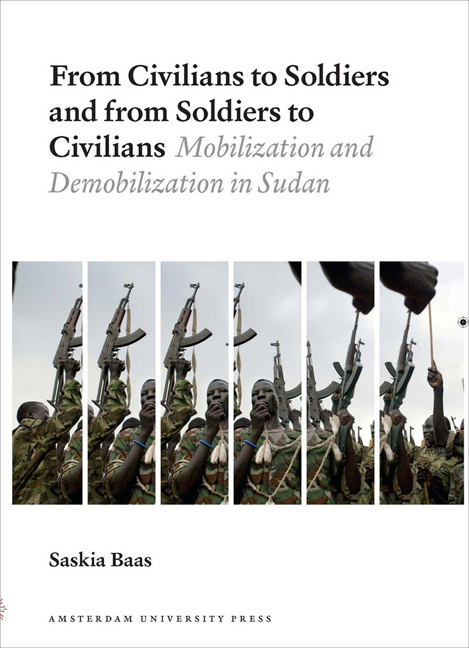Book contents
- Frontmatter
- Dedication
- Contents
- Acknowledgements
- List of Acronyms
- 1 Introduction
- 2 Recruitment
- 3 Becoming a soldier
- 4 At War's End
- 5 DDR Policies and Realities in Sudan
- Concluding Remarks
- Appendix I: Checklist Interviews Former Combatants
- Appendix II: Example of an Interview Report
- Notes
- Bibliography
- Index
- Frontmatter
- Dedication
- Contents
- Acknowledgements
- List of Acronyms
- 1 Introduction
- 2 Recruitment
- 3 Becoming a soldier
- 4 At War's End
- 5 DDR Policies and Realities in Sudan
- Concluding Remarks
- Appendix I: Checklist Interviews Former Combatants
- Appendix II: Example of an Interview Report
- Notes
- Bibliography
- Index
Summary
On 9 July 2011 South Sudan became the 193rd nation of the world, after its population had nearly unanimously voted for independence in a referendum for self-determination. The referendum and the subsequent secession of South Sudan from the north were the final outcome of over half a century of civil war between armed opposition movements in the South and subsequent governments in Khartoum. Armed rebellion has also occurred in other peripheral areas of Sudan, of which the ongoing civil war in the western region of Darfur forms an example. The current work addresses the question of how civilians become soldiers during civil war. More specifically, it investigates the processes of mobilization and demobilization in several armed movements in Sudan. Why do civilians, at some point during a conflict, decide to participate in the violence of the war? What are the consequences of becoming part of a guerilla movement during conflict? And, once a civil war has come to an end, how can former fighters be reintegrated into civilian life?
Explaining civil war
The dynamics of armed conflict has become a prominent object of social scientific inquiry, as the international community has come to play a more significant role in attempting to end civil wars. While policy analysts tend to focus on practical issues related to conflict resolution and post-conflict reconstruction, current theoretical debates among academics center around the more fundamental questions of what causes civil wars to erupt, continue and end. One of the principal discussions among scholars concerns the motivation of actors in civil war, and the extent to which they are informed by either greed or grievance. These debates will be briefly discussed before specifying the aims of the current research and the methodological issues that are attached to it.
Economic agendas in civil war
The classical approach to civil war assumes that armed rebellion against state authorities results from grievances over some perceived deprivation of wealth or power, often based on ethnic divisions. Recently, contributions to the debate made by economists – most notably by World Bank economist Paul Collier – have focused on the rationality of civil wars, emphasizing economic motivations of the actors involved. Criticizing the grievance paradigm in political science, Collier argues that actors in civil wars are driven by economic opportunities that are attached to armed rebellion.
- Type
- Chapter
- Information
- From Civilians to Soldiers and from Soldiers to CiviliansMobilization and Demobilization in Sudan, pp. 13 - 36Publisher: Amsterdam University PressPrint publication year: 2012



